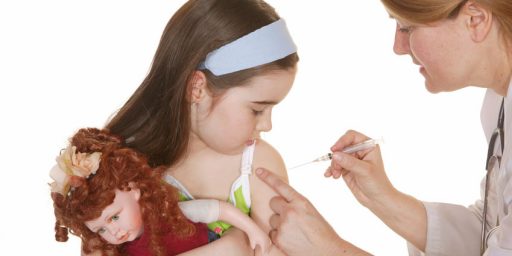Autism Up 78% Since 2000!
The estimated number of U.S. autistic kids has skyrocketed by 78% since 2000, according to a report from the federal Centers for Disease Control and Prevention.
A CNN Breaking News alert informs me,
The estimated number of U.S. autistic kids has skyrocketed by 78% since 2000, according to a report from the federal Centers for Disease Control and Prevention. One in 88 American kids has autism, according to the new figures. Among boys, it’s one in 54.
Why? One expert says: “Better diagnosis, broader diagnosis, better awareness, and roughly 50% of ‘We don’t know.'”
One advocate says: “we have an epidemic of autism in the United States.”
Now, it’s quite possible that we have an “epidemic of autism.” But, if so, we’ve always had it. What’s happening is that we’re now classifying things that were considered quirks of behavior when I was in grade school as mental illness. That’s quite possibly a good thing. It’s probably useful to have names for things and for parents and kids to know that certain aberrant behaviors aren’t their fault. But what we have is almost certainly an increase in diagnosis rather than an increase in the underlying condition.






Quite right, but expect an increase in anti-vaccination woo as a result of this study.
That would be a proposition.
To make it science, you have to design an experiment, and test it.
Are there genetic markers for autism? Can they be back-tested in previous populations?
@john personna: There are likely genetic markers, since everything will turn out to be genetic at some point. At this point, though, it’s diagnosis of symptoms and applying a label. So, no, I don’t think we have any way of going back and testing previous cohorts.
Still, it’s virtually inconceivable that some external factor other than the diagnostics have changed so radically in the last dozen years as to lead to a 78% uptick.
My guess was similar (I’d go with 75%/25%, but who the hell knows?).
Autism is a spectrum disorder. Some diagnosed kids would likely have just been seen as a bit odd decades ago (e.g. lots of kids with Aspergers). Others… no. Serious autism is not just “hey that kid is kinda strange.”
More research needed. My guess is a heavy genetic component, plus environmental factors that can increase risk. But a guess is all that is.
Epidemic? No, I don’t think so. But that’s the sort of thing you’d expect to hear from an advocate.
There’s also been some recent research that low levels of vitamin D can increase the probability of autism. So not just genetics. It could be that people have less vitamin D because they are staying out of the sun more than ever before, because of a) skin cancer, and b) we’re all becoming computer geeks.
Also, older fathers tend to produce more autistic children. Yet another thing that’s happening more often than ever before.
@James Joyner:
The reason the expert doesn’t just decide on one explanation is that he (or she) sees a composite.
I would also stick with “We don’t know” until some test or experiment is designed. It is actually often the case that “don’t know” is the stronger answer. We have a childhood aversion to that of course, and prefer people who “have an answer.” This sometimes, though not always, favors those who leap to an unsupported position. See also the nightly business reports.
Related: Conservatives’ Trust In Science Has Fallen Dramatically Since Mid-1970s
@Franklin:
I hope this exonerates my dislike of sunscreen. I’m somewhat over the recommended doses of sunlight for a white boy.
This report will only feed the anti-vaccine crazies.
Damn scientists.
Whatever the cause, I’m moving some of my investments into short-bus manufacturers.
Autism appears to be heritable but its genetics is quite complicated. There is no single autism gene and no clinical test for it. The best thinking right now is that it’s caused by the interaction of multiple genes.
I note that one of the factors that might explain an increase hasn’t been mentioned yet: selective breeding.
@john personna: Heh, yeah, me, too. But it’s definitely a balance, especially when that white boy has a family history of skin cancer like this one.
@Dave Schuler: Good point, yes, I believe that’s been suggested of the high rate of autism in Silicon Valley?
@john personna: Regarding the Scientific American article you linked to: I think my interest in autism stems from the fact that I have a kid with another one of those “when did this start happening so much” diseases: an allergy to peanuts. The rise in that may also be largely environmental (although again, there’s some evidence of other factors as well, including better diagnosis).
@Franklin: Older fathers are likelier to be near their peak earning years, and have greater access to health care, and would then be more likely to have their kids diagnosed.
In other words, any correlation can have many, many factors. Designing studies is hard.
Which is why I propose that for all identical twins, one of the children must be given up for adoption, and both must receive some kind of tracking implant. It will help determine the degree of genetic contribution to a variety of conditions.
@Gustopher: I bet that would produce a mountain of useable information … but I’m thinking there might be some resistance to the idea, heh.
All’s we really have to do is computer model every possible factor and every possible combinations of those factors. I figure by the time the sun envelopes the Earth, we should be getting pretty close to having some idea of what’s going on.